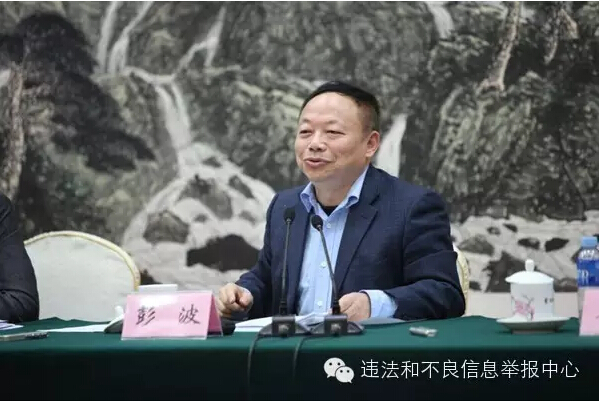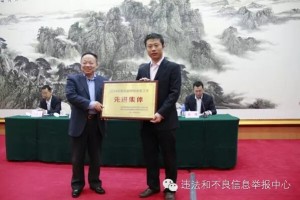The Cyberspace Administration of China (CAC) held a meeting on “Internet reporting work” in Beijing on April 14, as reported in the translated article below. Peng Bo, deputy to cyberspace czar Lu Wei, noted progress last year in “constructing a basic framework for the national Internet reporting system.” The basic framework for reporting “harmful” and “illegal” information posted online is surely already in place—Google has hits for “Internet reporting work” (网络举报工作) dating back to 2004, and the report states that representatives from hundreds of websites and from local Internet reporting offices were present. Awards were given at the conference for “advanced” teams and individuals, which are listed at the end.
According to the report, Peng stressed “the clear growth of the public’s consciousness of and fervor for participating in Internet reporting work.” In addition to the paid commentary of the “Fifty Cent Party,” the Communist Youth League has launched a “Youth Internet Civilization Volunteer Campaign” that will involve about 10.5 million participants, spreading “positive energy” online and reporting “incorrect” comments that disparage socialism.
Peng also states that “websites must be urged to undertake primary responsibility for content management.” Censorship is delegated to Chinese Internet companies, and failure to self-censor to the satisfaction of the government can have serious consequences for the company. Earlier this month, the CAC threatened Sina’s news services with “a complete shut down” for just such an offense.
The conference emphasizes “international cooperation” and learning from experiences beyond China. China is increasingly vocal on the international stage about its style of Internet governance and its right to control the Internet within its borders. “Internet sovereignty” was the theme of the World Internet Conference, hosted by China outside Shanghai last fall. While mostly Chinese companies attended that conference, China has also made Internet sovereignty an issue at the U.N., while distributed denial-of-service (DDoS) attacks last month on GreatFire.org and the codesharing platform GitHub, apparently targeted for hosting banned websites to allow access behind the Great Firewall, have been traced to China.
National Internet Reporting Work Conference Convenes in the Capital
Cyberspace Administration of China
On the morning of April 14, the General Office of the Central Leading Group for Cyberspace Affairs (GOCLGCA) held a national Internet reporting work conference. The conference reviewed Internet reporting in 2014, announced work plans for 2015, and gave awards to 24 advanced teams and 30 advanced individuals who did an outstanding job in Internet reporting in 2014. Peng Bo, the deputy director of GOCLGCA, attended the conference and gave a speech.
Peng Bo fully acknowledged the outstanding achievements in Internet reporting work in the past year. He pointed out that, since 2014, national Internet reporting work has firmly focused on governing the country by law and governing the Internet by law. Progress has also been made in stressing key points, strengthening the mechanism [of reporting], full participation in cyberspace governance, pushing forward various tasks, constructing a basic framework for the national Internet reporting system, prominently elevating the position of reporting work, clearly promoting the utility of development, the clear growth of the public’s consciousness of and fervor for participating in Internet reporting work, and international cooperation in Internet reporting.
Peng Bo stressed that building an Internet power and realizing a total clean-up of the Internet will not happen without Internet reporting work. Every website in every locale must attach great importance to the function of Internet reporting in the cleaning up of the Internet, practically engage the power of public scrutiny, and take further steps to enrich and perfect China’s Internet clean-up model. A unified and coordinated national Internet reporting work system must be built as soon as possible, websites must be urged to undertake primary responsibility for content management, and harmful online information must be consciously cleaned up. We must strengthen publicity for the Internet reporting system as well as Internet laws and regulations, further promoting the awareness of the general public to report and to defend their rights. We must draw on the experience of the international community, strengthen international communication and cooperation, and further improve the work of managing the Internet according to law.
The leading cadres of all local Internet reporting offices and the heads of the reporting offices of hundreds of websites were in attendance.

“Deputy Director Peng Bo giving an award to an advanced team.” From the “Reporting Center for Illegal and Unhealthy Information” official WeChat account.

Peng Bo giving a speech. From the “Reporting Center for Illegal and Unhealthy Information” official WeChat account.
Advanced Teams and Individuals in National Internet Reporting Work
1. 2014 National Internet Reporting Work Advanced Teams
- Beijing Reporting Center for Illegal and Unhealthy Information on the Internet
- Sichuan Reporting Center for Illegal and Unhealthy Information on the Internet
- Shanghai Reporting Center for Illegal and Unhealthy Information on the Internet
- Jiangxi Reporting Center for Illegal and Unhealthy Information on the Internet
- Hubei Internet Reporting Center
- Jiangsu Reporting Center for Harmful Information Online
- Reporting Department, Hunan Internet Information Office
- Online News Administration, Tianjin Internet Information Office
- Online News Administration, Hainan Internet Information Office
- Reporting Working Unit, Hebei Internet Information Office
- Bureau of Internet Coordination, Shanxi Internet Information Office
- Bureau of Internet Supervision, Anhui Internet Information Office
- Chongqing Internet Information Office Reporting Center
- Henan Reporting Center for Illegal and Unhealthy Information on the Internet
- Guangxi Reporting Center for Illegal and Unhealthy Information on the Internet
- Xinhuanet.com
- People.com.cn
- QQ.com
- Dahe.cn
- Rednet.cn
- Tianya Club
- VoDone
- Qihoo 360
- Alibaba
2. 2014 National Internet Reporting Work Advanced Individuals
- Yan Song, Hunan Internet Information Office
- Fu Junlu, Jiangxi Internet Information Office
- Ma Haiyong, Shanghai Reporting Center for Online Information in Violation of Laws and Regulations
- Zhao Jimin, Hebei Internet Information Office
- Feng Jia, Guangxi Internet Reporting Center
- Wu Nanfu, Bureau of Internet Supervision, Anhui Internet Information Office
- Wang Qian, Beijing Internet Information Office
- Zhao Xiaoping, Internet Administration, Henan Internet Information Office
- Tian Dalu, Liaoning Internet Propaganda Management Administration
- Mao Yu, Emergency Response Department, Sichuan Reporting Center
- Lin Yuqun, Shenzhen Public Sentiment Emergency Response Command Center
- Wu Zhangyong, Youth.cn News and Editorial Center
- Qin Ling, Xinhuanet.com Legal Department
- Tan Kuanglong, JCRB.com
- Liu Chongzhi, China.com.cn
- Duan Ruolan, Office of the Editor-in-Chief, Chinadaily.com.cn
- Yangjizhuoga, QQ.com
- Ma Lili, China.com.cn
- Lü Jia, Sohu.com
- Wang Jun, NetEase
- Wang Ying, Guangxi News Net Interactive Center
- Tan Jing, Great Wall Net Reporting Center
- Chu Huiqi, Enorth.com.cn
- Lu Yu, Cqnews.net
- Min Ming, Office of the Editor-in-Chief, Eastday.com
- Ren Longhai, Law Enforcement Department, Tianya Club
- Zeng Bin, Club.kdnet.net
- Zhou Feng, Report Case Management Group, Ku6.com
- Yang Qi, Alibaba
- Lin Shan, Qihoo 360 [Chinese]
Translation by Mengyu Dong.










